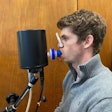
A wearable-powered artificial intelligence (AI) system developed by SensifAI Health can predict acute inflammation in COPD patients with 90% sensitivity. That’s according to a study, “Development of Machine Learning Prediction Models for Systemic Inflammatory Response Following Controlled Exposure to a Live Attenuated Influenza Vaccine in Healthy Adults Using Wearable Biosensors in Canada: A Single-Center, Prospective Controlled Trial.”
The WE SENSE study was published in The Lancet Digital Health and conducted at McGill University and the Research Institute of the McGill University Health Center (MUHC) in Montreal, Quebec, Canada. Researchers tested the AI platform, which analyzed passive biometric data from off-the-shelf wearables to develop a personalized inflammation score for trial participants.
All 55 individuals wore the Oura ring, 54 wore the Astroskin-Hexoskin Shirt and 50 wore the Biobeat smartwatch. The researchers found that systemic inflammatory biomarkers coupled with physiological data from wearable biosensors provided “rich and objective data from which to train machine learning algorithms to predict systemic inflammation.”
The researchers determined the combination approach outperformed symptom-based detection. Amir Hadid, PhD, CEO of SensifAI Health and co-lead author of the study, said in a news release the technology could help achieve the goal of delivering the right medication to the right patient at the right time.
“This isn’t just about early detection,” Dr. Hadid said. “It’s about our ability to widen the therapeutic window and deliver potentially lifesaving intervention days before the onset of symptoms. Our study results suggest that merging immunology, physiology, wearables and AI allows us to usher in a new era of preemptive health.”






















